Unit 10 If you go to the party, you'll have a great time! Section B 2a-2e课件(共40张PPT)
文档属性
| 名称 | Unit 10 If you go to the party, you'll have a great time! Section B 2a-2e课件(共40张PPT) |  | |
| 格式 | zip | ||
| 文件大小 | 3.9MB | ||
| 资源类型 | 教案 | ||
| 版本资源 | 人教新目标(Go for it)版 | ||
| 科目 | 英语 | ||
| 更新时间 | 2022-12-20 09:59:14 | ||
图片预览


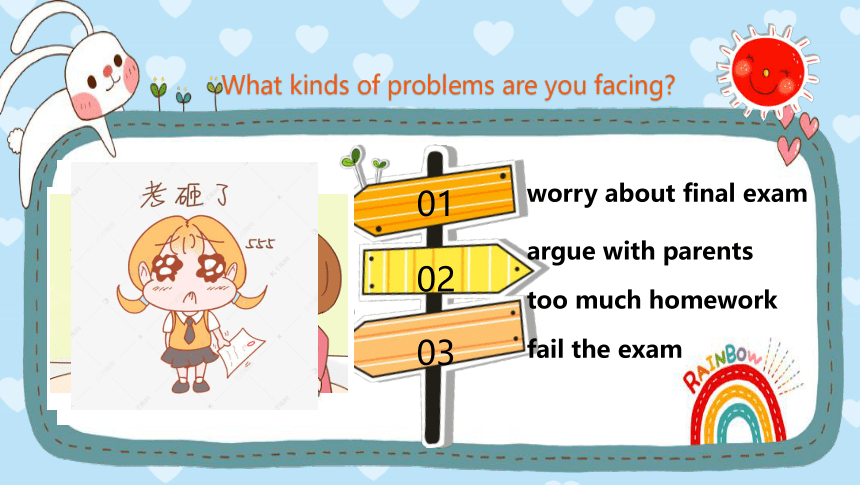
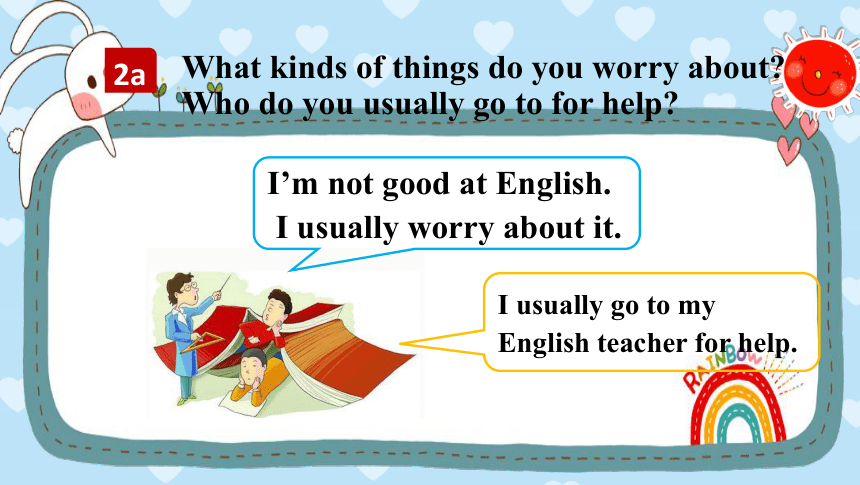
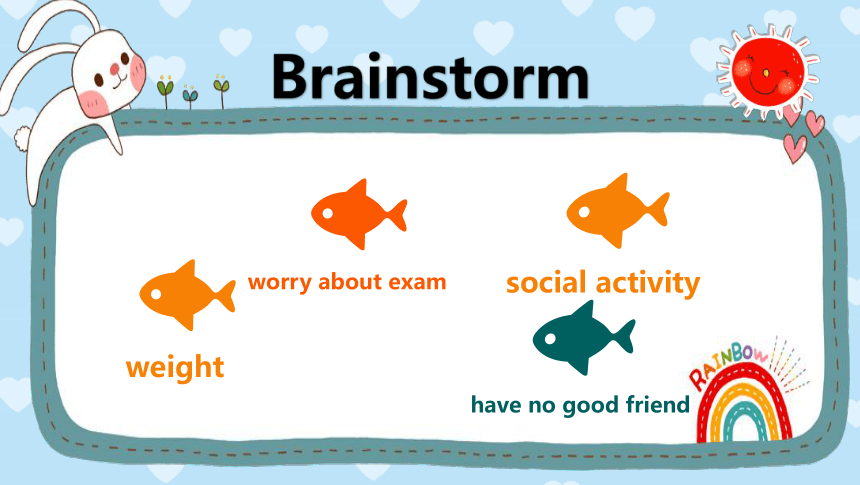
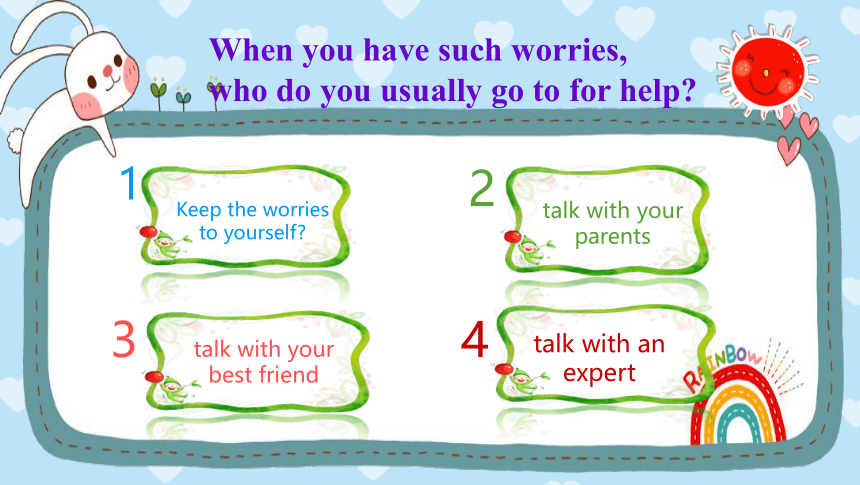

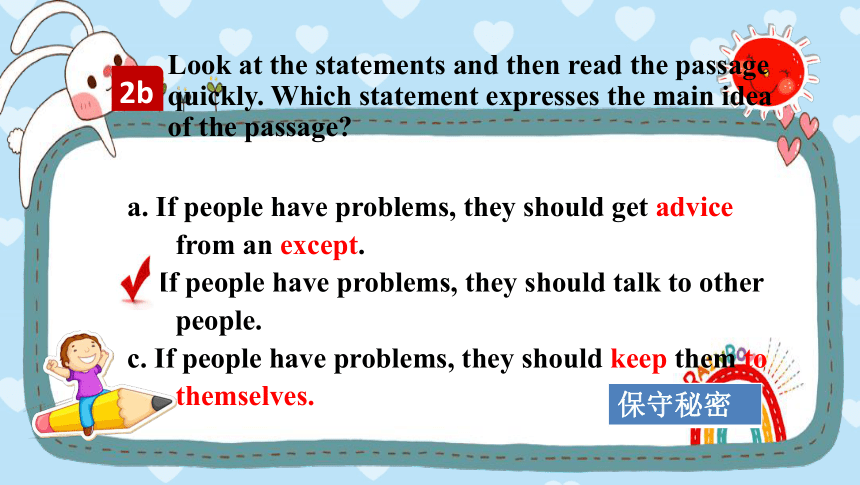
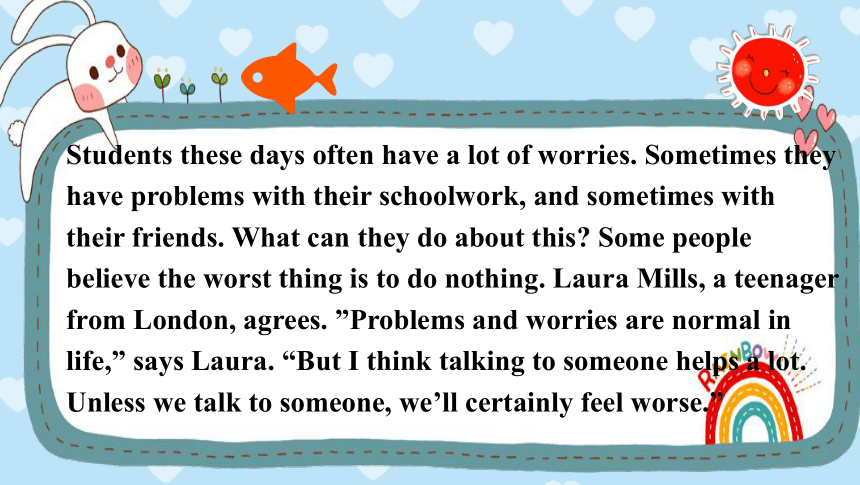
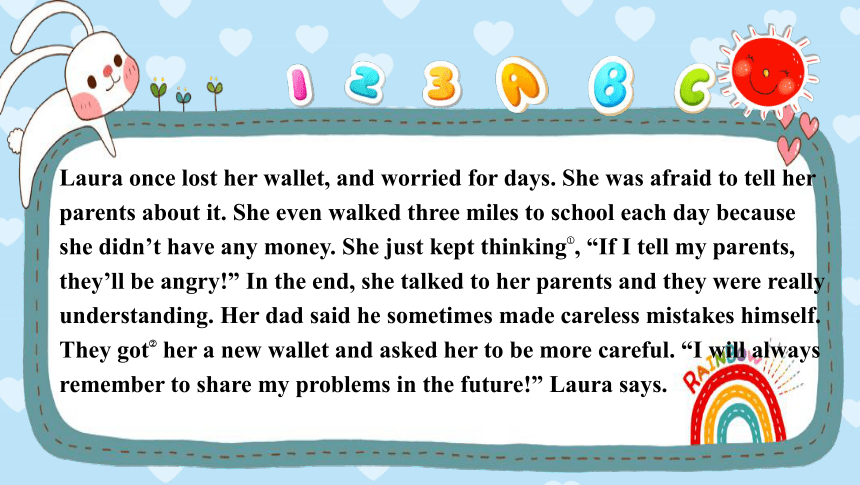
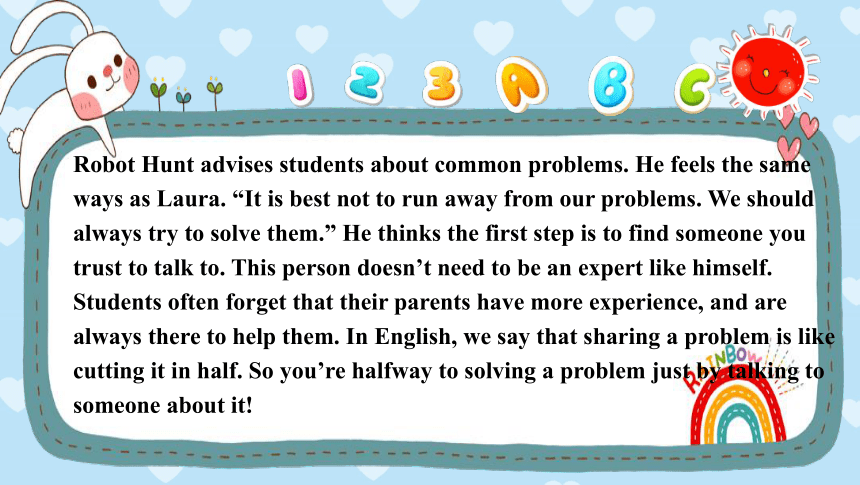
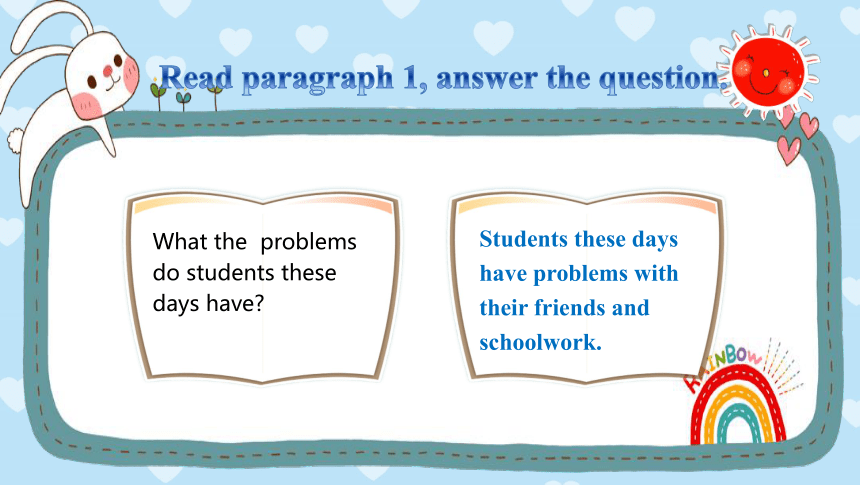
文档简介
(共40张PPT)
Unit10 If you go to the party,you’ll have a greatr time
SectionB 2a-2e
Lead-in
01
02
03
What kinds of problems are you facing
worry about final exam
argue with parents
too much homework
fail the exam
I’m not good at English.
I usually worry about it.
I usually go to my English teacher for help.
What kinds of things do you worry about Who do you usually go to for help
2a
weight
worry about exam
have no good friend
Brainstorm
social activity
1
Keep the worries to yourself
talk with your parents
2
talk with your best friend
3
talk with an expert
4
When you have such worries,
who do you usually go to for help
Reading
Look at the statements and then read the passage quickly. Which statement expresses the main idea of the passage
a. If people have problems, they should get advice from an except.
b. If people have problems, they should talk to other people.
c. If people have problems, they should keep them to themselves.
2b
保守秘密
Students these days often have a lot of worries. Sometimes they have problems with their schoolwork, and sometimes with their friends. What can they do about this Some people believe the worst thing is to do nothing. Laura Mills, a teenager from London, agrees. ”Problems and worries are normal in life,” says Laura. “But I think talking to someone helps a lot. Unless we talk to someone, we’ll certainly feel worse.”
Laura once lost her wallet, and worried for days. She was afraid to tell her parents about it. She even walked three miles to school each day because she didn’t have any money. She just kept thinking①, “If I tell my parents, they’ll be angry!” In the end, she talked to her parents and they were really understanding. Her dad said he sometimes made careless mistakes himself. They got② her a new wallet and asked her to be more careful. “I will always remember to share my problems in the future!” Laura says.
Robot Hunt advises students about common problems. He feels the same ways as Laura. “It is best not to run away from our problems. We should always try to solve them.” He thinks the first step is to find someone you trust to talk to. This person doesn’t need to be an expert like himself. Students often forget that their parents have more experience, and are always there to help them. In English, we say that sharing a problem is like cutting it in half. So you’re halfway to solving a problem just by talking to someone about it!
What the problems do students these days have
Students these days have problems with their friends and schoolwork.
Read paragraph 1, answer the question.
Read paragraph 2, underline the phrases in it.
1.害怕做某事
2.步行三英里去学校
3.最后
4.一直做某事
5.犯粗心的错误
6.如果我告诉父母,
他们会生气的。
Laura once lost her wallet, and worried for days. She was afraid to tell her parents about it. She even walked three miles to school each day because she didn’t have any money. She just kept thinking①, “If I tell my parents, they’ll be angry!” In the end, she talked to her parents and they were really understanding. Her dad said he sometimes made careless mistakes himself. They got② her a new wallet and asked her to be more careful. “I will always remember to share my problems in the future!” Laura says.
Read paragraph 3, complete the sentences.
1.It's best not _______(run)away from our problems
2. He thinks the first step is ______(find) someone you
trust to talk to.
3.In English, we say that_________ (share) a problem is like cutting it in half.
4.You’re halfway to _______ (solve) a problem just by______ (talk) to someone about it!
to run
to find
sharing
solving
talking
Read the passage again and answer the questions. Discuss your answers with a partner.
What is the worst thing to do if you have a problem
___________________________________________
2. Why didn’t Laura want to tell her parents about
her lost wallet
___________________________________________
To do nothing.
If she tells her parents, they will be angry.
2c
2312
3. What is the first thing you should do when you
want to solve a problem
__________________________________________________________
4. Why can our parents give us good advice about
our problems
________________________________
The first thing you should do is to find someone you trust to talk to.
Because they have more experience, and are always there to help us.
Students often have a lot of
problems and worries. Laura
Mills thinks the worst thing
is ___. She thinks you’ll feel
worse if you don’t ___ your
problems. Laura remembers
that she once lost her wallet and was afraid to ____
Fill in the blanks with the phrases in the box.
1.discuss your problems
2.tell her parents
3.unless you talk
4.run away from
5.talk to someone
6.share her problems
7.to do nothing
7
5
2
2d
about it. Now she believes you cannot feel better ____ to someone. She says she will always ____ in the future. Robert Hunt agrees with Laura. He thinks you should not ____ your problems, but you should try to solve them. If you cannot talk to an
expert like Robert, you can ____
with your parents, because they
have a lot of experience.
3
6
4
1
1
Ask three students the following questions. Take notes of their answers.
Problems with schoolwork Who you talk to and why Who you get advice from
Student A
Student B
Student C
2e
1. What problems do you have with schoolwork
2. Who do you talk to about these problems and why
3. Who else can you get advice from
4. Do you always tell your parents about your
problems Why or why not
5. Do you ever give advice to your friends about their
problems What advice do you give
Language points
1. If people have problems, they should try to keep them to themselves.
keep... to oneself意为“保守秘密”,如:
One must keep such interests to oneself.
有这类爱好不该让人知道。
We should keep their worries to themselves.
我们应该为他们的忧虑保守秘密。
Language points
keep... to oneself 还可意为“不与人来往;
不交际”,如:
Keep sb at arm’s length: not allow oneself to become too
friendly with sb.
与某人保持距离;不使自己太亲近某人。
2. Problems and worries are normal in life.
worries是名词worry的复数形式,意为“令人忧伤的人或事”;
worry意为“烦恼,忧愁,忧虑”,指因遭遇困难或不如意的事而苦闷,是不可数名词。如:
My chief worry is that he doesn’t have experience.
我的主要忧虑是他没有经验。
Her happiness at seeing him submerged her former worries.
她看到他非常高兴,顿时完全忘记了先前的烦恼。
worry作及物动词,意为“使担心”;做不及物动词,意为“ 担心”。
worry about / over sth / sb意为“担心某事/某人”。如:
Your worry is always triggered by some external event or happening.
你总是为一些外因或事情而烦恼。
Don’t worry, he'll be alright. 别担心,他不会有事的。
I did not want to worry my friend. 我没想麻烦我的朋友。
3. Her dad said he sometimes made careless mistakes himself.
careless做形容词,意为“粗心的”“不小心的”,
在句中可用作定语或表语。如:
It was careless of you to leave the door unlocked.
你没锁门,太粗心了。
The careless waiter dropped the dish onto the ground.
那个粗心的侍者把盘子摔到了地上。
mistake意为“错误,过失”,可指没有做对或做得不好的事物,也可指错误的想法或见解,还可指“误解”或“误会”。
mistake后可接介词短语、动词不定式、现在分词作定语。接about表示“关于……的错误”,接in表示“某方面的错误”。make a mistake表示“犯错误”; by mistake表示“错误地”。
4. They got her a new wallet and asked her to be
more careful.
get意为“买”,相当于buy,但不如后者正式。如:
Could you get me a ticket, please
请给我买张票好吗?
I usually get vegetables from that supermarket.
我通常从那家超市买蔬菜。
Which newspaper do you get
你订阅什么报纸?
5. In English, we say that sharing a problem is like cutting it in half. 在英语中,我们说与人分担一个烦恼就像把麻烦分成两半。
share 是“分享;分担;共同承担”的意思。如:
share a room with someone 与某人同住一个房间
share a book 同看一本书
share a taxi 同坐一辆出租车
Yes, I want to share my life with you.
是的,我想和你共享生活。
cut…in half…
“把……切成两半”“把……一切为二”,
cut 意为“切、剪”。
in half/ halves
是一种固定结构,此处in表示状态。如:
Please cut the orange in half.
Now, all the oranges are in half.
6. So you’re halfway to solving a problem just by talking to someone about it!
你只要跟人聊聊这个问题,你的问题就解决了一半。
be halfway to… 表示“完成了或者做了事情的一部分”,
其中to为介词。如:
we’re still only halfway to finishing the job.
我们才仅仅完成了工作的一部分。
Exercises
一. 用括号中所给单词的适当形式填空。
1. You mustn’t be a _________(care) driver.
2. It’s five _______(mile) from my home to school.
3. He is old enough to look after _________(he).
4. She is an _____________(understand) girl, and
everyone likes her.
5. They’re __________(certain) not mine.
careless
miles
himself
understanding
certainly
Exercises
二. 根据句意及汉语提示完成单词。
1. How do you become an ______(专家)
2. This is a _______(正常的) phase that we all go through.
3. I was glad he was a sympathetic and _____________
(善解人意的) man, and that she liked him.
4. What did you learn from this __________(错误)
5. The accident taught him to be more _______(小心的).
expert
normal
understanding
mistake
careful
三.翻译
1.害怕做某事
2.步行三英里去学校
3.最后
4.一直做某事
5.犯粗心的错误
6.如果我告诉父母,
他们会生气的。
1.be afraid to do sth.
2.walk three miles to school
3.in the end
4.keep doing sth.
5.make careless mistakes
6.If I tell my parents,they'll
be angry.
Homework
Review the expressions and structures you’ve learnt from the passage.
Homework
Try our best to do everything,tomorrow will be better.
Thank You
Unit10 If you go to the party,you’ll have a greatr time
SectionB 2a-2e
Lead-in
01
02
03
What kinds of problems are you facing
worry about final exam
argue with parents
too much homework
fail the exam
I’m not good at English.
I usually worry about it.
I usually go to my English teacher for help.
What kinds of things do you worry about Who do you usually go to for help
2a
weight
worry about exam
have no good friend
Brainstorm
social activity
1
Keep the worries to yourself
talk with your parents
2
talk with your best friend
3
talk with an expert
4
When you have such worries,
who do you usually go to for help
Reading
Look at the statements and then read the passage quickly. Which statement expresses the main idea of the passage
a. If people have problems, they should get advice from an except.
b. If people have problems, they should talk to other people.
c. If people have problems, they should keep them to themselves.
2b
保守秘密
Students these days often have a lot of worries. Sometimes they have problems with their schoolwork, and sometimes with their friends. What can they do about this Some people believe the worst thing is to do nothing. Laura Mills, a teenager from London, agrees. ”Problems and worries are normal in life,” says Laura. “But I think talking to someone helps a lot. Unless we talk to someone, we’ll certainly feel worse.”
Laura once lost her wallet, and worried for days. She was afraid to tell her parents about it. She even walked three miles to school each day because she didn’t have any money. She just kept thinking①, “If I tell my parents, they’ll be angry!” In the end, she talked to her parents and they were really understanding. Her dad said he sometimes made careless mistakes himself. They got② her a new wallet and asked her to be more careful. “I will always remember to share my problems in the future!” Laura says.
Robot Hunt advises students about common problems. He feels the same ways as Laura. “It is best not to run away from our problems. We should always try to solve them.” He thinks the first step is to find someone you trust to talk to. This person doesn’t need to be an expert like himself. Students often forget that their parents have more experience, and are always there to help them. In English, we say that sharing a problem is like cutting it in half. So you’re halfway to solving a problem just by talking to someone about it!
What the problems do students these days have
Students these days have problems with their friends and schoolwork.
Read paragraph 1, answer the question.
Read paragraph 2, underline the phrases in it.
1.害怕做某事
2.步行三英里去学校
3.最后
4.一直做某事
5.犯粗心的错误
6.如果我告诉父母,
他们会生气的。
Laura once lost her wallet, and worried for days. She was afraid to tell her parents about it. She even walked three miles to school each day because she didn’t have any money. She just kept thinking①, “If I tell my parents, they’ll be angry!” In the end, she talked to her parents and they were really understanding. Her dad said he sometimes made careless mistakes himself. They got② her a new wallet and asked her to be more careful. “I will always remember to share my problems in the future!” Laura says.
Read paragraph 3, complete the sentences.
1.It's best not _______(run)away from our problems
2. He thinks the first step is ______(find) someone you
trust to talk to.
3.In English, we say that_________ (share) a problem is like cutting it in half.
4.You’re halfway to _______ (solve) a problem just by______ (talk) to someone about it!
to run
to find
sharing
solving
talking
Read the passage again and answer the questions. Discuss your answers with a partner.
What is the worst thing to do if you have a problem
___________________________________________
2. Why didn’t Laura want to tell her parents about
her lost wallet
___________________________________________
To do nothing.
If she tells her parents, they will be angry.
2c
2312
3. What is the first thing you should do when you
want to solve a problem
__________________________________________________________
4. Why can our parents give us good advice about
our problems
________________________________
The first thing you should do is to find someone you trust to talk to.
Because they have more experience, and are always there to help us.
Students often have a lot of
problems and worries. Laura
Mills thinks the worst thing
is ___. She thinks you’ll feel
worse if you don’t ___ your
problems. Laura remembers
that she once lost her wallet and was afraid to ____
Fill in the blanks with the phrases in the box.
1.discuss your problems
2.tell her parents
3.unless you talk
4.run away from
5.talk to someone
6.share her problems
7.to do nothing
7
5
2
2d
about it. Now she believes you cannot feel better ____ to someone. She says she will always ____ in the future. Robert Hunt agrees with Laura. He thinks you should not ____ your problems, but you should try to solve them. If you cannot talk to an
expert like Robert, you can ____
with your parents, because they
have a lot of experience.
3
6
4
1
1
Ask three students the following questions. Take notes of their answers.
Problems with schoolwork Who you talk to and why Who you get advice from
Student A
Student B
Student C
2e
1. What problems do you have with schoolwork
2. Who do you talk to about these problems and why
3. Who else can you get advice from
4. Do you always tell your parents about your
problems Why or why not
5. Do you ever give advice to your friends about their
problems What advice do you give
Language points
1. If people have problems, they should try to keep them to themselves.
keep... to oneself意为“保守秘密”,如:
One must keep such interests to oneself.
有这类爱好不该让人知道。
We should keep their worries to themselves.
我们应该为他们的忧虑保守秘密。
Language points
keep... to oneself 还可意为“不与人来往;
不交际”,如:
Keep sb at arm’s length: not allow oneself to become too
friendly with sb.
与某人保持距离;不使自己太亲近某人。
2. Problems and worries are normal in life.
worries是名词worry的复数形式,意为“令人忧伤的人或事”;
worry意为“烦恼,忧愁,忧虑”,指因遭遇困难或不如意的事而苦闷,是不可数名词。如:
My chief worry is that he doesn’t have experience.
我的主要忧虑是他没有经验。
Her happiness at seeing him submerged her former worries.
她看到他非常高兴,顿时完全忘记了先前的烦恼。
worry作及物动词,意为“使担心”;做不及物动词,意为“ 担心”。
worry about / over sth / sb意为“担心某事/某人”。如:
Your worry is always triggered by some external event or happening.
你总是为一些外因或事情而烦恼。
Don’t worry, he'll be alright. 别担心,他不会有事的。
I did not want to worry my friend. 我没想麻烦我的朋友。
3. Her dad said he sometimes made careless mistakes himself.
careless做形容词,意为“粗心的”“不小心的”,
在句中可用作定语或表语。如:
It was careless of you to leave the door unlocked.
你没锁门,太粗心了。
The careless waiter dropped the dish onto the ground.
那个粗心的侍者把盘子摔到了地上。
mistake意为“错误,过失”,可指没有做对或做得不好的事物,也可指错误的想法或见解,还可指“误解”或“误会”。
mistake后可接介词短语、动词不定式、现在分词作定语。接about表示“关于……的错误”,接in表示“某方面的错误”。make a mistake表示“犯错误”; by mistake表示“错误地”。
4. They got her a new wallet and asked her to be
more careful.
get意为“买”,相当于buy,但不如后者正式。如:
Could you get me a ticket, please
请给我买张票好吗?
I usually get vegetables from that supermarket.
我通常从那家超市买蔬菜。
Which newspaper do you get
你订阅什么报纸?
5. In English, we say that sharing a problem is like cutting it in half. 在英语中,我们说与人分担一个烦恼就像把麻烦分成两半。
share 是“分享;分担;共同承担”的意思。如:
share a room with someone 与某人同住一个房间
share a book 同看一本书
share a taxi 同坐一辆出租车
Yes, I want to share my life with you.
是的,我想和你共享生活。
cut…in half…
“把……切成两半”“把……一切为二”,
cut 意为“切、剪”。
in half/ halves
是一种固定结构,此处in表示状态。如:
Please cut the orange in half.
Now, all the oranges are in half.
6. So you’re halfway to solving a problem just by talking to someone about it!
你只要跟人聊聊这个问题,你的问题就解决了一半。
be halfway to… 表示“完成了或者做了事情的一部分”,
其中to为介词。如:
we’re still only halfway to finishing the job.
我们才仅仅完成了工作的一部分。
Exercises
一. 用括号中所给单词的适当形式填空。
1. You mustn’t be a _________(care) driver.
2. It’s five _______(mile) from my home to school.
3. He is old enough to look after _________(he).
4. She is an _____________(understand) girl, and
everyone likes her.
5. They’re __________(certain) not mine.
careless
miles
himself
understanding
certainly
Exercises
二. 根据句意及汉语提示完成单词。
1. How do you become an ______(专家)
2. This is a _______(正常的) phase that we all go through.
3. I was glad he was a sympathetic and _____________
(善解人意的) man, and that she liked him.
4. What did you learn from this __________(错误)
5. The accident taught him to be more _______(小心的).
expert
normal
understanding
mistake
careful
三.翻译
1.害怕做某事
2.步行三英里去学校
3.最后
4.一直做某事
5.犯粗心的错误
6.如果我告诉父母,
他们会生气的。
1.be afraid to do sth.
2.walk three miles to school
3.in the end
4.keep doing sth.
5.make careless mistakes
6.If I tell my parents,they'll
be angry.
Homework
Review the expressions and structures you’ve learnt from the passage.
Homework
Try our best to do everything,tomorrow will be better.
Thank You
同课章节目录
- Unit 1 Where did you go on vacation?
- Section A
- Section B
- Unit 2 How often do you exercise?
- Section A
- Section B
- Unit 3 I'm more outgoing than my sister.
- Section A
- Section B
- Unit 4 What's the best movie theater?
- Section A
- Section B
- Unit 5 Do you want to watch a game show?
- Section A
- Section B
- Unit 6 I'm going to study computer science.
- Section A
- Section B
- Unit 7 Will people have robots?
- Section A
- Section B
- Unit 8 How do you make a banana milk shake?
- Section A
- Section B
- Unit 9 Can you come to my party?
- Section A
- Section B
- Unit 10 If you go to the party, you'll have a grea
- Section A
- Section B
